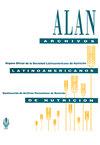来自巴西东北部家庭健康战略的老年人粮食不安全和营养不良
IF 0.3
4区 医学
Q4 NUTRITION & DIETETICS
引用次数: 3
摘要
粮食不安全(FI)是一种以获取食物的不稳定和不规律为特征的状态。这种情况对饮食摄入有负面影响,影响营养状况和健康状况。目的:评价家庭健康战略(FHS)下社区居住老年人营养不良与FI之间的关系。材料和方法:这是一项横断面研究,在巴西巴伊亚州巴雷拉斯市的FHS下,对社区居住的老年人进行了研究。在2017年至2018年期间,我们收集了人口统计、社会、经济、健康状况、生活方式、人体测量和食品消费数据。我们使用迷你营养评估(MNA)评估营养状况,并使用巴西粮食不安全量表(EBIA)评估FI。除了卡方检验外,我们还进行了二元逻辑回归来验证营养不良与FI之间的关联,并对可能的混杂因素进行了调整。显著性水平p<0.05。结果:我们评估了307名老年人,平均年龄为70.4(±7.5岁)。营养不良患病率/营养不良风险为35.2%,FI为63.5%。有老年人患有中度/重度FI的家庭几乎有三倍的机会(OR 2.97;(ci95(1.37-6.44)))与有粮食保障的人相比。结论:该研究表明,家庭FI与家庭家庭中老年人的营养不良/营养不良风险之间存在关联,尤其是那些严重FI的老年人。这一结果归因于FI在调查背景下老年人营养不良的决定因素。本文章由计算机程序翻译,如有差异,请以英文原文为准。
Food insecurity and malnutrition in older adults from the Family Health Strategy in the Northeast of Brazil
Introduction: Food insecurity (FI) is a state characterized by instability and irregularity of access to food. This condition has negative impacts on dietary intake, affecting nutritional status and health condition. Objective: To evaluate the association between malnutrition and FI among communitydwelling older adults attended to under the Family Health Strategy (FHS). Materials and methods: This is a cross-sectional study conducted using communitydwelling older adults attended to under the FHS in the municipality of Barreiras, in Bahia, Brazil. Between 2017 e 2018, we collected demographic, social, economic, health condition, lifestyle, anthropometric, and food consumption data. We evaluated nutritional status using the Mini Nutritional Assessment (MNA) and we assessed FI with the Brazilian Food Insecurity Scale (EBIA). Besides the chi-squared test, we carried out a binary logistic regression to verify the association between malnutrition and FI, adjusted for possible confounding factors. The significance level was p<0.05. Results: We evaluated 307 older adults with a mean age of 70.4 (±7.5 years). The prevalence of malnutrition/risk of malnutrition was 35.2% and that of FI was 63.5%. Households with older adults in moderate/severe FI presented almost three times more chance (OR 2.97; CI95% 1.37-6.44) of having malnutrition compared with those in food security. Conclusions: The study indicates that there is an association between household FI and malnutrition/risk of malnutrition among older adults from the FHS, especially among those in severe FI. This result attributes to FI the status of determinant of malnutrition in older adults within the context investigated.
求助全文
通过发布文献求助,成功后即可免费获取论文全文。
去求助
来源期刊
CiteScore
0.50
自引率
0.00%
发文量
31
期刊介绍:
Archivos Latinoamericanos de Nutrición (ALAN) is the official publication of the Sociedad Latinoamericana de Nutición (SLAN), for the dissemination of knowledge in the fields of food and nutrition, principally throughout the American Hemisphere. Articles in Spanish, English, Portuguese and French are accepted, both from the Society members and from nonmembers, in the following categories: 1. General articles (critical scientific reviews); 2. Research articles (originals); 3. Papers in applied nutrition (analytical results from intervention programs and discussion of reconmendations of practical application), and 4. Letters to Editor (short comments of general interest or about scientific facts and results previously published in Archives).

 求助内容:
求助内容: 应助结果提醒方式:
应助结果提醒方式:


